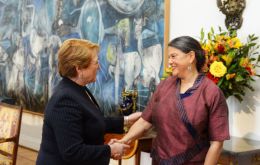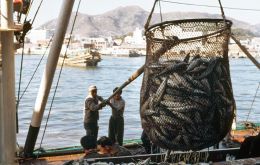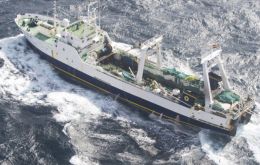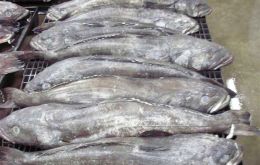MercoPress. South Atlantic News Agency
Tag: FAO Committee on Fisheries
-
Monday, December 11th 2017 - 01:48 UTC
Fishing subsidies to be on the WTO summit table in Buenos Aires

Meeting for the first time in Latin America, the World Trade Organization’s 11th Ministerial Conference will take place in Buenos Aires from 10-13 December. Central to this year’s talks will be an international deal to curb harmful fishing subsidies. These are government payments or tax breaks that contribute to overcapacity, overfishing and illegal fishing (IUU) globally.
-
Wednesday, October 26th 2016 - 05:39 UTC
FAO recommends improvements to Chile's Fisheries Act: environment, food security and working conditions

President of Chile Michelle Bachelet received this week at the La Moneda presidential palace, the final report from FAO on the current situation of the Fisheries and Aquaculture Act (LPGA) governing this activity in Chile.
-
Tuesday, May 31st 2016 - 17:30 UTC
FAO sponsored illegal fishing accord scheduled to become law on 5 June; 30 countries have adhered

Illegal, unregulated and unreported (IUU) fishing is about to become much more difficult thanks to the imminent entry into force of the Port State Measures Agreement (PSMA), a ground-breaking international accord championed by FAO.
-
Wednesday, February 24th 2016 - 07:50 UTC
FAO summit in Morocco addresses fish trade traceability and eliminating IUU fishing

High-level delegations of fisheries ministries from more than 50 countries are gathering in Agadir, Morocco for a summit with industry players to discuss emerging governance needs in a sector that provides the world with 17% of its animal protein and developing countries with more export revenue than meat, tobacco, rice and sugar combined.
-
Monday, May 18th 2015 - 05:17 UTC
FAO's agenda includes fighting illegal fishing in the Mediterranean and Black Sea

In a global context of fierce competition for fishery resources which are progressively being depleted as a consequence of overfishing, overexploitation and overcapacity, illegal, unreported and unregulated (IUU) fishing has become a growing concern, points out a FAO fisheries release.
-
Thursday, February 6th 2014 - 04:58 UTC
Aquaculture will provide close to two thirds of global food fish by 2030, says FAO

Aquaculture, or fish farming, will provide close to two thirds of global food fish consumption by 2030 as catches from wild capture fisheries level off and demand from an emerging global middle class, especially in China, substantially increases.
-
Tuesday, March 5th 2013 - 04:20 UTC
FAO sponsored guidelines for flag sate accountability and cutting illegal fishing

After several years of negotiations, countries have taken a major step against illegal, unreported and unregulated fishing (IUU), one of the greatest threats to sustainable fisheries and related livelihoods.
-
Thursday, February 10th 2011 - 23:33 UTC
FAO admits illegal fishing remains major threat; calls for a global record of fishing vessels

Countries are making progress in implementing the Code of Conduct for Responsible Fisheries, which is now 15 years old, but still extremely relevant. However, additional efforts are needed, declared participants at the close of the 29th session of the FAO Committee on Fisheries.
